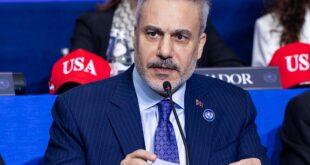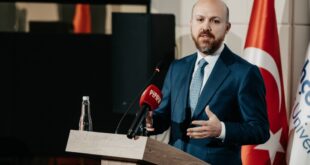Heads of state and government of the members of the Southeast European Cooperation Process, SEECP, gathered today in Istanbul under the chairmanship of Turkish President Abdullah Gul.
The gathering touched on a variety of issues relevant to the countries in the region, including EU membership, regional cooperation, and the fight against organised crime.
At the end of the meeting, Montenegrin President Filip Vujanovic took over the chairmanship of the organisation from Turkey, saying that his country sees the post as a challenge and an incentive to provide substantial contributions to regional cooperation.
“We are deeply committed to the strengthening of democracy, rule of law, promoting human rights and freedoms- meaning investing efforts for their promotion throughout the region of Southeast Europe,” Vujanovic said.
Turkey’s Gul, who hosted the summit, told those gathered: “We are all determined to crown this partnership that we are improving on the basis of the shared values with the membership of the EU, which we consider to be a poem of values and a project of civilizations.
“Our paths will intersect under the umbrella of the EU, about which we have no doubt. We as the countries of the region are resolute to walk towards this aim. Everyone should be sure about this. On the other hand, we expect the EU to stand by us on the road to the full membership and to avoid taking steps that might delay the accession process.”
Serbian President Boris Tadic, one of the first to address the regional leaders this morning, said that the EU must clearly say whether it is ready to accept all the countries in the region under its wing.
“Only when all of Southeast Europe is integrated into the EU will the promised era of peace that began with the fall of the Berlin Wall really begin,” Tadic said.
He reiterated that Belgrade will never recognise Kosovo’s unilateral declaration of independence, and noted that new talks on the Kosovo issue may start after the International Court of Justice, ICJ, delivers its opinion on whether Kosovo’s independence violated international law.
Speaking about the importance of regional cooperation, Tadic noted that its focus must be on the fight against organised crime, which threatens the prosperity of the region.
SEECP, a regional organisation founded in 1996, includes Turkey, Albania, Bosnia and Herzegovina, Bulgaria, Croatia, Greece, Montenegro, Macedonia, Moldova, Romania, Serbia and Slovenia.
The organisation aims to strengthen economic and political cooperation, and promote good neighbourly relations and the joint fight against organised crime.
According to the statement issued by Turkish Foreign Ministry, a “Summit Declaration” is to be adopted by the member states at the gathering, and Turkey will hand over the chairmanship of the organisation to Montenegro at the end of the summit.
Several related meetings were held in the run up to today’s gathering of regional leaders. The political directors of the SEECP and the foreign ministers of the member states met in Istanbul on June 21 and 22.
Meanwhile, the Regional Cooperation Council, the successor of the Stability Pact for South Eastern Europe, held its annual meeting as part of the SEECP summit. At the gathering, the foreign ministers of the SEECP member states re-appointed Hido Biscevic as Secretary General of the RCC.
In addition, a forum on “South East European Countries on Cultural Corridors” under the theme “Music as a Metaphor of Cultural Dialogue in South East Europe”, will be held with the sponsorship of UNESCO and the European Council.
 Eurasia Press & News
Eurasia Press & News



